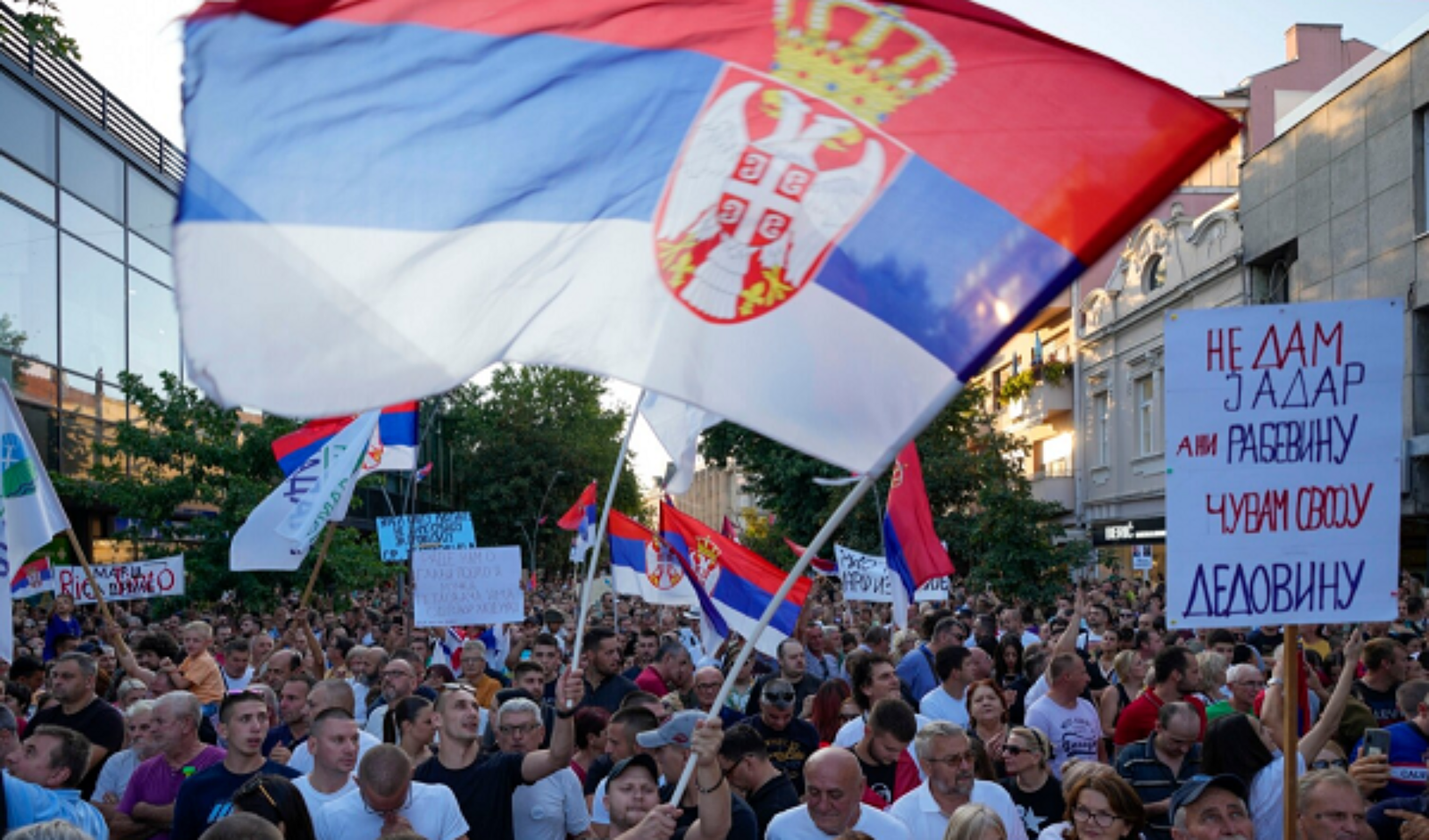The construction of the lithium mine in the Jadar River Valley in western Serbia has the potential to spark widespread protests in the country once again. This is due to the concerns held by a portion of the citizens and activists who firmly believe that the mine would have significant environmental consequences. The opposition to the project stems from fears of pollution, habitat destruction, and water contamination in the region.
Lithium is a crucial mineral used in batteries for cell phones, computers, and electric vehicles. The demand for lithium has been steadily increasing with the rise of electric vehicles and renewable energy technologies. However, the environmental impact of mining lithium, especially in sensitive areas like the Jadar River Valley, has raised alarm bells among environmentalists and local communities. The potential disruption to the ecosystem, water sources, and overall environmental health of the region is a major concern that has led to calls for more sustainable and eco-friendly alternatives to be considered.
In the last few days, protests have been held in at least ten cities of Serbia with the message “there will be no mines”.
Environmental movements in Serbia, including “Nuk e japim Jadarin” (Ne damo Jadar), have announced a large protest in Belgrade on August 10, while the Serbian president, Aleksandar Vučić, warns of the possibility of a referendum on the issue.
The Serbian government, precisely under the pressure of environmental protection protests, stopped the lithium mine project in the Jadar river valley near Lloznica two years ago, but the Serbian authorities announced in early 2024 that the issue was “on hold”.
Thus, on July 16 of this year, the authorities in Serbia restored the regulation for the creation of the spatial plan for the implementation of the “Jadar” project, which includes the use of jadarite minerals – lithium and boron.
Jadarites were discovered in 2004 in the west of Serbia by the international mining company Rio Tinto. That company, whose headquarters is in London, is now interested in the construction of a lithium mine in the valley of the Jadar River, which is a tributary of the Drina River.
Serbian President Aleksandar Vučić claims that lithium mining in Serbia will contribute to economic development and the creation of new jobs, and that the underground lithium mine could be opened in the next four years, but with guarantees from the European Union (EU ) that the environment will be preserved.
The lithium mining project in the Jadar River valley, located in western Serbia, has raised significant environmental concerns. Rio Tinto, the company behind the initiative, has announced that this region contains one of the largest lithium reserves in Europe, with plans to produce 58,000 tons of lithium annually. This output is projected to be sufficient to power approximately 1.1 million electric vehicles, which would account for about 17 percent of the electric vehicles in Europe. The scale of this operation has sparked debates about its potential impact on the local ecosystem and the surrounding communities.
In an effort to reassure the public, Rio Tinto has emphasized the safety measures and environmental standards that will be implemented throughout the mining process. On July 19, a Memorandum of Understanding was signed in Belgrade between the European Union and Serbia, establishing a strategic partnership focused on sustainable raw materials, battery production chains, and electric vehicles. This agreement highlights the importance of responsible resource extraction and aims to foster collaboration between Serbia and the EU in achieving sustainable development goals.
German Chancellor Olaf Scholz has publicly supported the Rio Tinto project, asserting that lithium extraction is beneficial for Serbia’s economic growth. Alongside Maroš Šefčovič, the Vice President of the European Commission, Scholz emphasized the commitment to adhering to the highest environmental standards during the lithium mining operations. This initiative aligns with the EU’s broader strategy to reduce dependence on lithium imports from China, particularly as Germany stands as the largest producer of electric vehicles in Europe that rely on lithium batteries. The project is seen as a crucial step towards facilitating a green transition in the automotive industry.
In the future, lithium will be just as important for mobility as oil has been up to now. Serbian President Aleksandar Vucic also promised to insist on protecting the environment and that the water, land, and air in the Jadar Valley will remain clean. He stated that he has received guarantees from the EU that the “Jadar” project will be implemented according to the highest environmental standards.
What is being contested?
Serbian citizens and environmental activists believe that lithium mines will be more harmful than beneficial. They fear that there may be significant environmental consequences for the sake of minimal economic gain. The controversy lies in the fact that the mining project involves the mining giant Rio Tinto, a company facing resistance from environmental organizations and scientists worldwide. This company has faced accusations of environmental destruction and human rights violations in the global market.
One of the most famous examples is the case in Papua New Guinea, where the population rebelled due to government pressure to continue work in a gold and copper mine. The rebellion turned into a civil war for the independence of the island of Bougainville, which was fought from 1988 to 1997. The involvement of Rio Tinto in the lithium mining project has sparked concerns and opposition from various groups due to the company’s controversial history and the potential environmental impact of its operations.
The stance of the opposition in Serbia is predominantly against lithium mining. A significant number of opposition parties have united in their opposition, voicing concerns over the environmental and social implications of such mining activities. Their collective position reflects a broader apprehension regarding the potential consequences of lithium extraction on local communities and ecosystems, emphasizing the need for sustainable practices and responsible governance.
The demands put forth by these opposition parties are varied and encompass a range of actions. They include calls for extraordinary elections, organized protests, and a general uprising against the government’s policies. Additionally, there is a push for a parliamentary session dedicated to discussing lithium mining, as well as a request for the National Assembly to deliberate on a citizen initiative aimed at banning the exploration and extraction of lithium and boron throughout the country. This initiative, which garnered 38,000 signatures from citizens, was submitted to the Assembly in May 2022 but has yet to be placed on the agenda for discussion.
In the ongoing session of the Serbian Assembly, which has been extended since July 23 with 60 items on the agenda, lithium mining remains a central topic of debate. Meanwhile, President Aleksandar Vučić has hinted at the possibility of a referendum on this issue by the end of next year. He suggested that citizens would not be choosing between “digging and health,” but rather between “false concerns and economic progress and prosperity.” Vučić also indicated that he is awaiting a local expert analysis regarding environmental protection, while accusing the opposition of conducting a “negative campaign” and spreading “falsehoods” about lithium mining.
Which countries still have lithium?
Lithium, also known as white gold, can mainly be found in the lithium triangle consisting of Bolivia, Argentina, and Chile.
World leader in lithium production in 2023 was Australia, followed by Chile and China, according to Statista, a company specialized in market and consumer data.
In the USA – which ranks fourth in the world with around 9 million tons in terms of lithium resources – there is a mine for its exploitation.
According to data from Demostat based in Belgrade – a non-governmental research and publishing center – the European Union is one of the largest consumers of lithium in the world, but it does not produce it, rather imports it, mainly from China.
To reduce this dependency on China, at least when it comes to the key raw material for battery production, Europe needs to also exploit its own lithium deposits, which are found in several countries across the old continent.
According to Demostat, candidates are Germany, Czech Republic, France, Portugal, but the EU is also supporting Serbia.
Among the countries in the region, lithium deposits are still being sought in Bosnia and Herzegovina in the Lopari and Zvornik areas. According to estimates from the Swiss mining company Arcore AG, around 2.4 million tons of lithium carbonate can be stored there.







